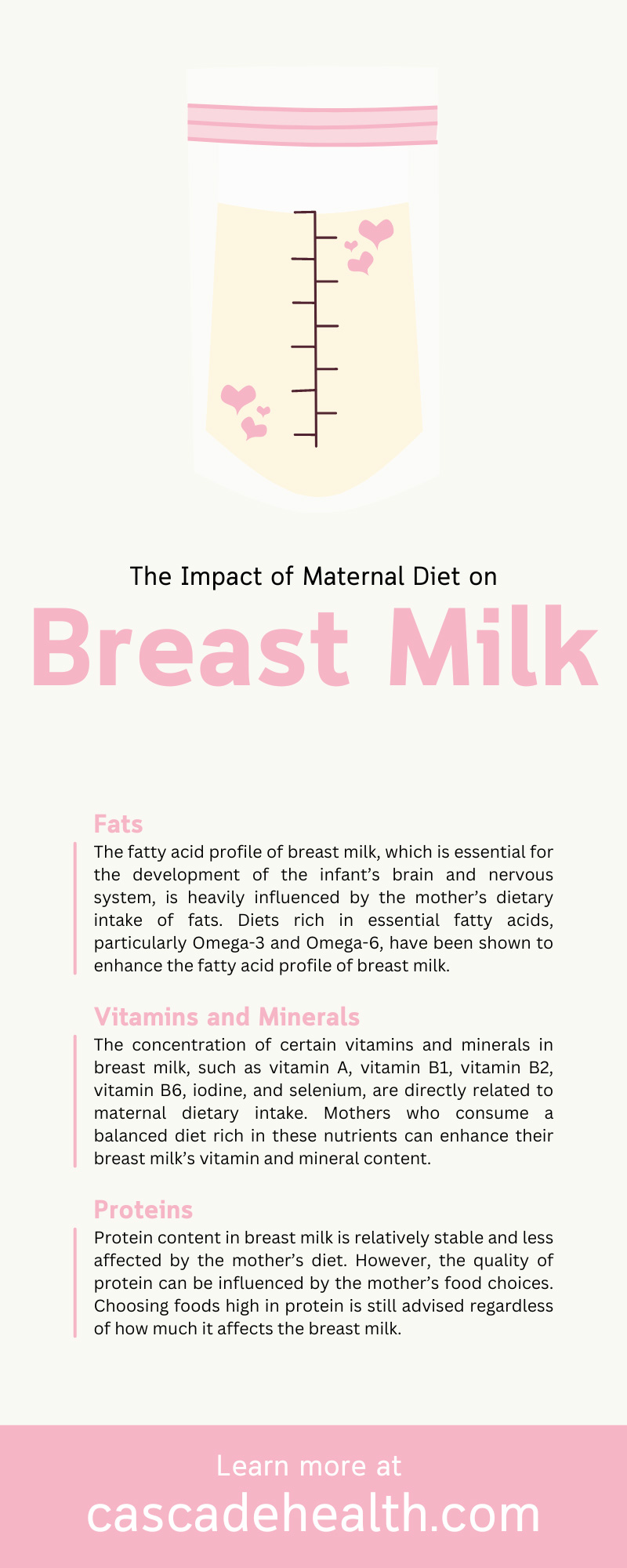The Impact of Maternal Diet on Breast Milk
The importance of breast milk in an infant’s early development is well-documented and universally accepted. Not only does breast milk provide the necessary nutrients for growth, but it also supplies essential antibodies that help to protect an infant from various diseases or illnesses.
However, something often overlooked is the significant role the mother’s diet plays in determining the quality and composition of her breast milk. We take a comprehensive look at the impact of maternal diet on breast milk and shed light on the value of a quality, well-rounded maternal nutrition plan. Let’s begin!
The Composition of Breast Milk
Breast milk is a complex fluid, containing an array of nutrients including proteins, fats, carbohydrates, vitamins, and minerals, along with bioactive compounds such as antibodies and hormones. The precise composition of breast milk can vary based on several factors, one of the most significant being the mother’s diet.
Mothers are generally advised to eat nutrient-dense foods that follow their daily needs and wishes. Regardless of a mother’s primary diet preferences, vegan, vegetarian, carnivorous, pescatarian, or any other option, a breastfeeding mother should consider their intake with the highest regard to ensure adequate breast milk support and supply. Additionally, breastfeeding mothers should consider how their mineral intake supports their breast milk and accommodate the remaining supply for their personal mineral stores.
The Influence of Maternal Diet on Breast Milk Nutrients
Breast milk contains a range of nutrient stores from fatty acids to proteins and just about everything in between. But it’s essential to note the mother’s macronutrient intake will have little impact on her breast milk. Conversely, the mother’s immediate diet containing fatty acids will directly impact the breast milk produced that day and beyond.
Additionally, a mother’s habitual dietary intake will affect her breast milk composition over the long term. Examples of this are caffeine intake, adequate hydration levels, alcohol consumption, and general eating habits on a large scale whether eating enough or too little. We examine primary dietary influences below to better understand the maternal diet’s effects on breast milk composition.
Fats
The fatty acid profile of breast milk, which is essential for the development of the infant’s brain and nervous system, is heavily influenced by the mother’s dietary intake of fats. Diets rich in essential fatty acids, particularly Omega-3 and Omega-6, have been shown to enhance the fatty acid profile of breast milk. Common and simple fats mothers should consider in their daily diet include:
- Full-fat yogurts
- Eggs
- Avocados
- Olive oil
Vitamins and Minerals
The concentration of certain vitamins and minerals in breast milk, such as vitamin A, vitamin B1, vitamin B2, vitamin B6, iodine, and selenium, are directly related to maternal dietary intake. Mothers who consume a balanced diet rich in these nutrients can enhance their breast milk’s vitamin and mineral content.
Many mothers will consume various foods throughout the day or their breastfeeding journey that contain these essential vitamins and minerals without their knowledge. But when looking for ways to support this effort even more, consider the following options:
- Fish oils
- Bell peppers
- Salmon
- Pork chops
Proteins
Protein content in breast milk is relatively stable and less affected by the mother’s diet. However, the quality of protein can be influenced by the mother’s food choices. Choosing foods high in protein is still advised regardless of how much it affects the breast milk.
A mother loses a lot of her mineral stores by offering breast milk and eating adequate protein levels can support her individual health while she supports her growing infant’s health. Common but easy protein options include:
- Meat
- Legumes
- Nuts
- Seeds
It’s essential to note that every dietary preference will adhere to a protocol regarding various protein options. Choose a reliable protein source that works best for you whether it’s meat, nuts, or legumes.
The Impact of Maternal Malnutrition
Maternal malnutrition can lead to deficiencies in crucial nutrients in breast milk. For example, a diet deficient in vitamin A can lead to a lower concentration of this essential vitamin in breast milk, potentially affecting the infant’s immune function. As mentioned above, a breastfeeding mother needs nutritional support during the breastfeeding journey, aside from supporting the breast milk supply.
Only supporting the supply and offering the breast can lead to maternal malnutrition and potentially a decrease in supply altogether. A lack of vital nutrients can deplete the mother emotionally and physically and cause unnecessary stress. Unfortunately, too much stress can significantly impact a breast milk supply and the overall landscape of the breastfeeding journey.
The Role of Maternal Supplementation
Supplementation can play a vital role in cases where dietary intake may be inadequate or during certain periods like lactation where nutrient needs are increased. It can help to ensure that breast milk contains the necessary levels of key nutrients, irrespective of the mother’s dietary intake. While it’s best to follow a “nutrition first, supplement second” mindset, supplementing vital minerals can do a great service for breastfeeding mothers who may find very little time to themselves.
Something as simple as sitting down to enjoy a hot meal becomes a luxury when a breastfeeding infant is in the picture. Supplementing core minerals can help alleviate these differences, in addition to assisting the mother in restoring lost minerals during the pregnancy to postpartum transition.
A Note From Cascade Health Care
The impact of maternal diet on breast milk is evident and significant. It underscores the importance of mothers maintaining a balanced, nutrient-rich diet for the optimal health and development of their infants. However, it’s also crucial to remember that every woman’s body is unique, and individual dietary needs may vary. Therefore, consulting a healthcare professional or a nutritionist can provide personalized dietary advice and guidance. Remember, a healthy mother leads to a healthy baby, and a well-nourished diet plays an integral role in this equation.
Cascade Health Care is proud to support all breastfeeding mothers and experiences and offers a comprehensive selection of lactation consultant teaching tools for providers and professionals alike. We guarantee with our inventory that professionals have on-demand access to educational supplies that support their clients and the breastfeeding narrative. Shop with us today to get everything you need for your organization and patients.

Recent Posts
-
Best Practices for Cleaning and Maintaining Pulse Oximeters
Midwives and medical professionals understand the critical nature of accurate patient data. When mon
-
What To Do With Birthing Supplies After a Home Birth
Home birth is on the rise. As families increasingly seek the comfort and autonomy of birthing in the



